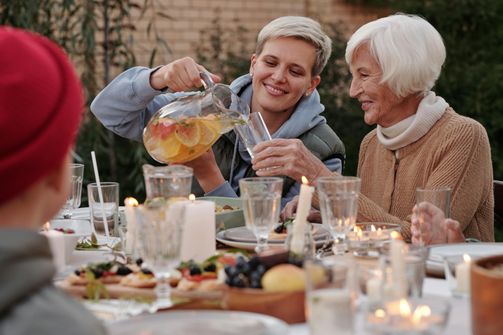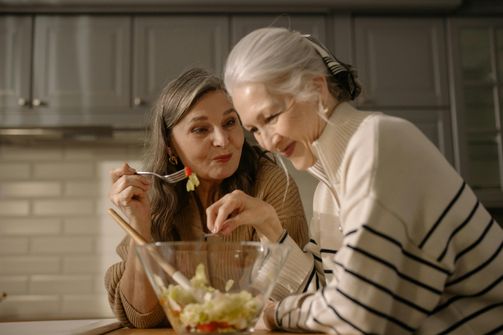
Longevity Lessons from Women in Blue Zones: How Their Lifestyle Can Inspire Healthier Living
Women from Blue Zones—regions of the world known for their high rates of longevity—live longer, healthier lives, often free from chronic disease well ...

Imagine you’re about to unlock a secret garden—a place where the promise of health rejuvenation lies hidden within the ancient practice of fasting. Amidst the blooming research, intermittent fasting, time-restricted eating, and periodic fasting stand as pillars that support the archway into this garden.
Each method, be it the 16/8 approach, confining meals to a 6-8 hour window, or periodic fasting, which involves taking entire days off from eating, is a path lined with scientific evidence illustrating benefits from weight loss to enhanced mental sharpness.
As we journey through life, our bodies whisper tales of change, especially noticeable post-menopause. Here, a metabolic whisper becomes a noticeable conversation, with a 1-2% decline per decade in resting metabolic rate, as highlighted by Mishra and colleagues in 2015.
The dance of hormones, especially the quieting of estrogen, leads not just to a ballet of bodily changes but marches us towards a higher risk of heart tales, as The Progress in Cardiovascular Diseases elucidate.
Meanwhile, the strength of our muscles begins to fade, up to 3% per decade after the age of 30, as WebMD says underscoring a narrative of transformation that calls for attention and action.

Fasting, in its various forms, is akin to a chisel, sculpting away at the challenges posed by aging. Varady’s 2015 study paints a picture of potential, with fasting leading to a weight reduction of 3-8% over 3-24 weeks.
The exploration published in The British Journal of Nutrition into the lives of adults aged 55-75 showcases significant strides in insulin sensitivity and waistline reductions, a beacon of hope for many. Moreover, the cerebral benefits show fasting as a nurturing force against oxidative stress and inflammation, potentially safeguarding our mental fortress.
Embarking on the fasting journey, especially in the golden years, requires a map to navigate potential pitfalls. Nutritional deficiencies, particularly concerning vitamin D, calcium, and protein, loom as specters in the shadows.
This, coupled with the intricate dance of medication timings that might require nutritional partners, calls for a vigilant eye and the guidance of healthcare professionals to illuminate the path forward.

Equipped with the knowledge that our bodies call for 1,200 mg/day of calcium and 800 IU/day of vitamin D post-50, as per The Institute of Medicine, and an escalated protein need of 1.0-1.2 g/kg body weight/day to combat muscle waning, the journey of fasting intertwines with the quest for nutritional adequacy. This compass, guiding through eating windows, ensures the body’s symphony plays harmoniously.
The 5:2 diet emerges as a versatile thread in the fasting tapestry, offering a palette from which older women can paint a lifestyle both vibrant and attuned to their unique health narratives.
This approach, blending days of normal eating with days of moderated intake (500-600 calories), offers a tapestry rich with flexibility and nutritional mindfulness.
Beyond mere weight management, fasting rejuvenates the metabolic engine, enhancing the body’s proficiency in fueling itself with stored fats, as Anton and colleagues elucidate. This metabolic zest not only supports weight management but also heralds a reduction in disease risk, a toast to health and vitality.
With the narrative evolving, the preservation of muscle and bone health ascends the stage. Fasting, when choreographed with resistance training, becomes a powerful duet for sustaining muscle mass and amplifying physical vigor, as The American Journal of Clinical Nutrition has showcased. This partnership not only supports physical function but enlivens the daily dance of life.
At this juncture, ensuring nutritional completeness takes precedence, with frailty and a gentle decline in energy needs directing the script. Tailoring fasting rituals to incorporate nutrient-dense meals and considering shorter fasting intervals can weave a safety net, ensuring the dietary fabric is rich, colorful, and fulfilling.
The fasting voyage for elderly women is a mosaic of health, vitality, and personal growth. It’s a journey that demands a bespoke map, drawn with the ink of professional guidance and the colors of individual needs. As we venture further into the landscape of research, the promise of fasting as a vessel for health and longevity shines ever brighter, illuminating a path laden with evidence-based wisdom. Here, each woman becomes the architect of her health odyssey, guided by the constellations of scientific insight and personal discovery.
A: Fasting can be safe for elderly women when tailored to individual health conditions and nutritional needs. It’s important to consult with a healthcare provider before starting any fasting regimen, especially for those with chronic conditions or taking medications.
A: Yes, fasting has been shown to aid in weight management by promoting fat loss while preserving muscle mass. However, elderly women should focus on a balanced approach to ensure they receive adequate nutrition.
A: Potential benefits include improved metabolic health, enhanced cognitive function, better blood sugar control, and possibly a lower risk of chronic diseases. These benefits can contribute to a higher quality of life and increased longevity.
A: There’s concern that fasting might exacerbate muscle loss, a natural part of aging. Incorporating protein-rich foods during eating periods and engaging in resistance training can help mitigate this risk.
A: Modified fasting methods, like the 5:2 diet or time-restricted eating within an 8-hour window, can be more suitable for elderly women. These methods allow for a gentler approach to fasting, reducing risks of nutritional deficiencies.
A: Elderly women should ensure they’re getting a balanced diet rich in essential nutrients, stay hydrated, and monitor their health closely. It’s also crucial to adjust any medications as needed in consultation with a healthcare provider.
A: Fasting can have beneficial effects on blood sugar levels and cardiovascular health, potentially improving or mitigating chronic conditions. However, individual responses can vary, and supervision by a healthcare professional is recommended.
A: Research suggests that fasting may have neuroprotective effects, potentially improving cognitive function and lowering the risk of neurodegenerative diseases. However, more research is needed specifically focusing on elderly women.
A: A balanced diet rich in vegetables, fruits, whole grains, lean proteins, and healthy fats is important. Special attention should be given to calcium, vitamin D, and protein intake to support bone and muscle health.
A: While some elderly women might find daily intermittent fasting beneficial, it’s important to adopt a flexible approach that considers individual health status and nutritional needs. Consulting with a dietitian or healthcare provider can help determine the best fasting schedule.

Women from Blue Zones—regions of the world known for their high rates of longevity—live longer, healthier lives, often free from chronic disease well ...

As science advances, it’s becoming clear that nutrition is not a one-size-fits-all solution. Enter nutrigenomics, a field of research that explores ho...

When it comes to fasting, timing is everything—literally. Aligning your eating patterns with your body’s circadian rhythm—your internal 24-hour clock—...

As women age, the nutritional needs of their bodies change, and so does the focus on maintaining health through diet. For women over 50, the omnivore ...

That first cup of piping hot black tea in the morning is practically a sacred ritual for many of us. The rich, earthy aroma wafting through the kitche...